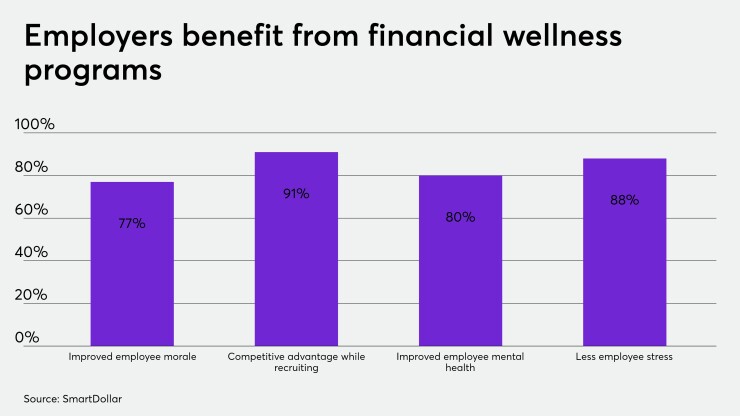Financial wellness is about more than just employees’ wallets. Stress over money and security can impact workers’ emotional and physical well-being — and can end up costing employers in the long run. An increasing number of organizations are taking steps to provide support to their teams.
Sixty-two percent of employers say they feel “extremely” responsible for their employees' financial wellness today, compared to 13% in 2013, according to Bank of America research.
Read More:
“Employers have recognized that employees’ financial needs have become more complex, so they have to take more responsibility to help them,” says Kevin Crain, the head of workplace solutions integration at Bank of America. “[We’ve seen] tremendous increases in terms of offering education, guidance and tools around budgeting, saving for college, and debt management.”
In a recent one-on-one interview, Crain discussed why employers are feeling more responsibility for employee financial wellness, what specific benefits they should be offering and how supporting employees’ financial wellness pays off for employers.
Why are employers feeling greater responsibility for their employees’ financial wellness?
They recognize that if they don't help employees with their immediate financial security, as well as their intermediate and long term security, employees are going to have issues. If the employer takes on that responsibility, 80% realize they are going to get tangible benefits: more loyal employees, greater employee productivity.
How much does financial wellness impact an employee’s overall well-being?
There is an intersection of three big topics: financial wellness, emotional wellness and physical well-being. You cannot keep them separate. If an employee does not feel financially well, I can almost guarantee you they're feeling emotionally insecure. And if they're feeling emotionally insecure, medical science will show you that stress causes healthcare issues. That's the other reason employers feel more responsibility, because they're combining those things, and seeing there's a massive benefit if they do a much better job of helping their employees’ overall wellbeing.
What specific financial wellness-focused benefits should employers be offering?
A retirement plan. And depending on their healthcare strategy, if they are doing a high deductible health plan, they should be offering an HSA. Student debt support is also a fast accelerating benefit. Employers are getting more aggressive about offering true assistance, meaning monetary assistance. They can offer a stipend and just say ‘Hey, employee, we're going to give you this amount of money, and you need to use it to help reduce your student debt.’
Read More:
Finally, caregiving programs will be huge. There are 40 to 50 million people in this country who are caregivers. Employees who were caregivers in the past may have felt stigmatized, and didn’t even tell their employer because they thought the employer would look well upon them taking time off. Now, employers are recognizing this as a very important issue. So, much like employers did great things for young parents with babies and young children around leave programs, employers are now building effective caregiving programs.
Read More:
How does supporting employees’ financial wellness pay off for employers?
The first, most tangible point is productivity. Employees may lose multiple hours in a week of productivity because they are distracted, and they are concerned and they are stressed about their own personal financial security. Employers are realizing that financial wellness isn’t just buzzwords anymore. So if they really do this well, they will realize major productivity.
Additionally, if an employer wants to manage their healthcare costs, and moderate the healthcare costs impacting both them and the employee, having a financial wellness program will dramatically improve that ability to do so. If you don't have one, you're going to realize much greater healthcare costs due to emotional wellness and physical well-being issues.






